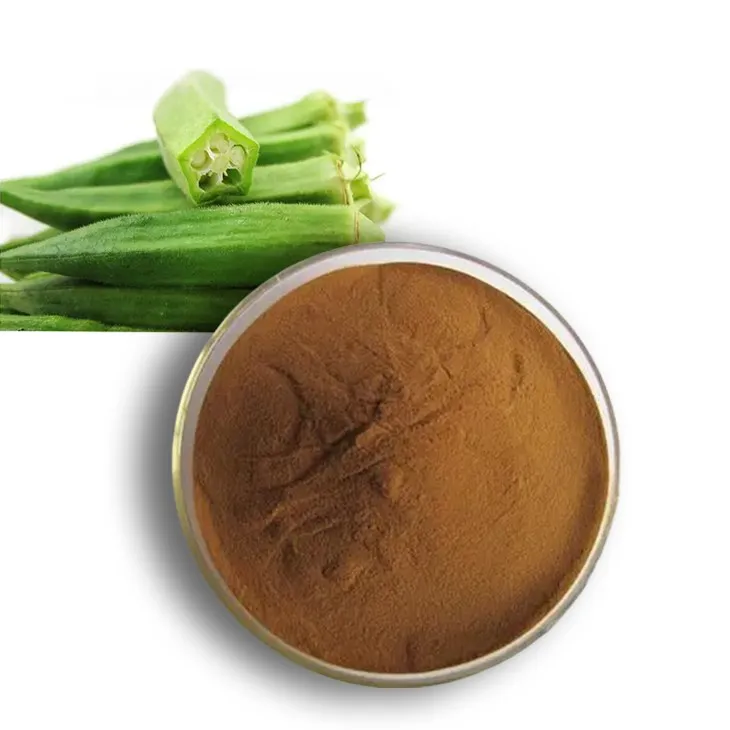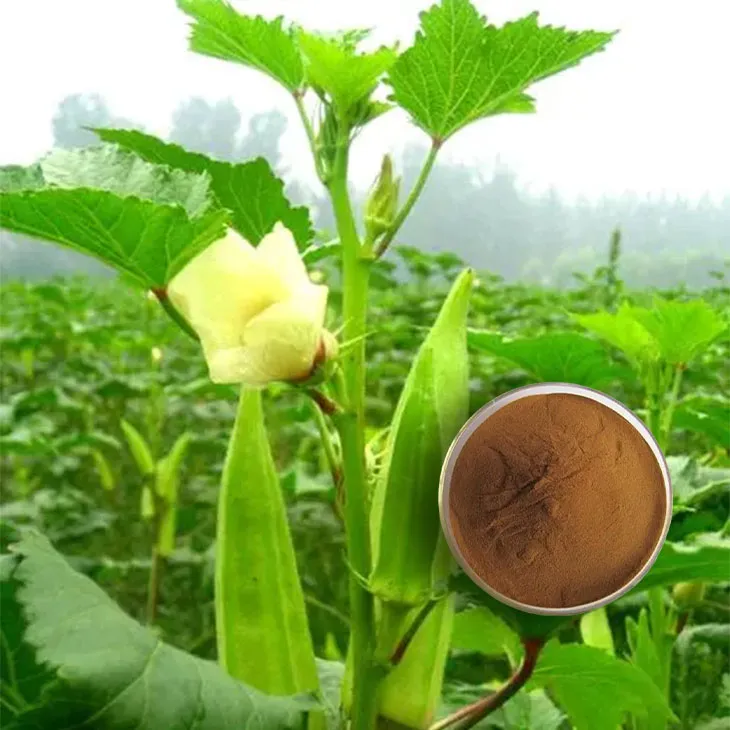- 0086-571-85302990
- sales@greenskybio.com
Is okra extract beneficial for diabetes? Are these all safe and applicable for diabetic patients?
2024-11-12

1. Introduction
Diabetes mellitus is a chronic metabolic disorder that has reached epidemic proportions globally. Management of diabetes typically involves lifestyle modifications, including diet and exercise, as well as pharmacological interventions. In recent years, there has been growing interest in natural products, such as Okra Extract, for their potential role in diabetes management. Okra, also known as Abelmoschus esculentus, is a plant native to Africa and is widely consumed in many parts of the world. The extract of okra contains various bioactive compounds that may have beneficial effects on diabetes. However, it is crucial to comprehensively examine its advantages and safety from different perspectives, including clinical trials, long - term effects, and safety considerations.

2. Bioactive Compounds in Okra Extract
Okra Extract is rich in several bioactive compounds that may contribute to its potential anti - diabetic effects.
2.1 Dietary Fiber
One of the major components of okra extract is dietary fiber. Dietary fiber can slow down the absorption of carbohydrates in the gut, which helps in preventing rapid spikes in blood glucose levels. It also promotes satiety, which can be beneficial for diabetic patients in managing their weight. Soluble fiber in particular forms a gel - like substance in the digestive tract, trapping carbohydrates and delaying their digestion and absorption.
2.2 Flavonoids
Okra contains flavonoids such as Quercetin and kaempferol. These flavonoids have antioxidant properties, which can protect cells from oxidative stress. Oxidative stress is known to be involved in the pathogenesis of diabetes and its complications. By reducing oxidative stress, flavonoids in okra extract may help improve insulin sensitivity and glucose metabolism.
2.3 Polyphenols
Polyphenols in okra extract also play a role in diabetes management. They can modulate various signaling pathways involved in glucose homeostasis. For example, some polyphenols may stimulate the secretion of insulin from pancreatic beta - cells or enhance the uptake of glucose by muscle and adipose tissues.

3. Clinical Trials on Okra Extract and Diabetes
Several clinical trials have been conducted to investigate the effects of okra extract on diabetes.
3.1 Blood Glucose Regulation
In some short - term clinical trials, diabetic patients who consumed okra extract showed a significant reduction in fasting blood glucose levels. For example, a study involving a group of type 2 diabetic patients found that after 4 weeks of taking a standardized okra extract supplement, the average fasting blood glucose decreased by approximately 10 - 15%. However, it is important to note that these results may vary depending on the dosage, the duration of the study, and the characteristics of the patient population.
3.2 Glycated Hemoglobin (HbA1c) Levels
HbA1c is a marker of long - term blood glucose control. Some clinical trials have examined the effect of okra extract on HbA1c levels. A meta - analysis of several small - scale trials suggested that okra extract may have a modest but significant effect on reducing HbA1c levels in diabetic patients. However, more large - scale, long - term clinical trials are needed to confirm these findings.
3.3 Lipid Profile
Diabetes is often associated with abnormal lipid profiles, including elevated levels of triglycerides and low - density lipoprotein (LDL) cholesterol. Some studies have reported that okra extract may also have a beneficial effect on lipid metabolism. In a trial with diabetic patients, those who took okra extract showed a decrease in triglyceride levels and a slight improvement in the ratio of LDL to high - density lipoprotein (HDL) cholesterol. This suggests that okra extract may contribute to reducing the cardiovascular risk associated with diabetes.

4. Long - Term Effects of Okra Extract in Diabetes
Understanding the long - term effects of okra extract on diabetes is essential for its potential use as a complementary therapy.
4.1 Progression of Diabetes
While short - term studies have shown promising results, it is unclear whether long - term consumption of okra extract can slow down the progression of diabetes. Diabetes is a progressive disease, and factors such as beta - cell function decline and insulin resistance increase over time. Long - term clinical trials are needed to determine if okra extract can maintain or improve beta - cell function and prevent the worsening of insulin resistance in diabetic patients.
4.2 Prevention of Complications
One of the major concerns in diabetes management is the prevention of complications, such as diabetic nephropathy, retinopathy, and neuropathy. Some pre - clinical studies have suggested that the bioactive compounds in okra extract may have protective effects against these complications. For example, the antioxidant and anti - inflammatory properties of okra extract may help reduce oxidative stress and inflammation in the kidneys, eyes, and nerves, which are key mechanisms in the development of diabetic complications. However, long - term human studies are required to validate these potential preventive effects.
5. Safety Considerations of Okra Extract for Diabetic Patients
When considering the use of okra extract for diabetes, safety is a crucial aspect.
5.1 Allergic Reactions
Some individuals may be allergic to okra. Allergic reactions can range from mild symptoms such as skin rashes and itching to more severe reactions like anaphylaxis. Diabetic patients who are considering using okra extract should be aware of their allergy history and consult a healthcare provider if they have any concerns about potential allergic reactions.
5.2 Drug Interactions
Okra extract may interact with certain medications used in diabetes management. For example, if a diabetic patient is taking medications to lower blood glucose levels, such as sulfonylureas or metformin, there is a possibility of an additive effect when combined with okra extract. This could potentially lead to hypoglycemia (low blood glucose levels). Therefore, it is important for diabetic patients to inform their healthcare providers if they plan to use okra extract to ensure proper monitoring of blood glucose levels and adjustment of medications if necessary.
5.3 Quality and Standardization
The quality and standardization of okra extract products on the market vary widely. Some products may not contain the claimed amount of bioactive compounds or may be contaminated with other substances. Diabetic patients should choose high - quality, standardized okra extract products from reliable sources to ensure safety and effectiveness.
6. Conclusion
Okra extract shows potential benefits for diabetes management based on its bioactive compounds, results from clinical trials, and possible long - term effects. It may help in regulating blood glucose levels, improving lipid profiles, and potentially preventing diabetic complications. However, safety considerations such as allergic reactions, drug interactions, and product quality need to be carefully addressed. More research, especially large - scale, long - term clinical trials, is needed to fully understand the role of okra extract in diabetes management and to determine its safety and efficacy for diabetic patients. Until then, diabetic patients should consult their healthcare providers before using okra extract as a complementary therapy for diabetes.
FAQ:
Question 1: What are the potential benefits of okra extract for diabetes?
Okra extract may have several potential benefits for diabetes. Some studies suggest that it could help in regulating blood sugar levels. Okra is rich in dietary fiber, which can slow down the absorption of carbohydrates, preventing rapid spikes in blood glucose. Additionally, it may contain certain bioactive compounds that have antioxidant and anti - inflammatory properties. These properties could potentially help in reducing oxidative stress and inflammation often associated with diabetes, which in turn may contribute to better management of the condition.
Question 2: Are there any clinical trials supporting the use of okra extract for diabetes?
There have been some clinical trials looking into the effects of okra extract on diabetes. However, the evidence is not entirely conclusive. Some small - scale trials have shown promising results, such as a reduction in fasting blood glucose levels among participants who consumed okra extract. But more large - scale, well - designed clinical trials are needed to firmly establish its efficacy. These trials need to take into account various factors like the dosage of okra extract, the duration of treatment, and the characteristics of the diabetic patients participating in the study.
Question 3: What are the long - term effects of using okra extract for diabetes?
The long - term effects of using okra extract for diabetes are still not fully understood. While short - term studies have indicated potential benefits in blood sugar control, it's unclear how continuous use over a long period would impact other aspects of diabetes management. There are concerns about possible long - term effects on kidney function, for example, as some compounds in okra might interact with the body's normal physiological processes over time. Also, the long - term effects on the gut microbiota, which can play a role in diabetes, are yet to be explored comprehensively.
Question 4: Is okra extract safe for all diabetic patients?
Okra extract may not be safe for all diabetic patients. Some individuals may be allergic to okra, and in such cases, using okra extract can lead to allergic reactions, which can range from mild skin rashes to more severe anaphylactic shock. Also, diabetic patients who are taking certain medications, such as blood - thinning drugs or medications for kidney problems, may experience interactions with okra extract. For example, okra contains vitamin K, which can interfere with the action of blood - thinning medications. Therefore, it is crucial for diabetic patients to consult their healthcare providers before starting to use okra extract.
Question 5: How should diabetic patients use okra extract?
If a diabetic patient is considering using okra extract, they should first consult their doctor. The doctor can provide guidance on the appropriate dosage based on the patient's individual health status, including factors like their current blood sugar levels, overall health, and any other medications they are taking. In general, it is important to start with a small dose and monitor for any adverse effects. It can be consumed in the form of a supplement or incorporated into the diet through cooked okra, but again, this should be done under medical supervision.
Related literature
- The Potential of Okra (Abelmoschus esculentus) in Diabetes Management: A Review of Current Evidence"
- "Okra Extract and Blood Glucose Regulation: Insights from Clinical and Pre - clinical Studies"
- "Safety Considerations of Herbal Supplements, including Okra Extract, in Diabetic Patients"
- ▶ Hesperidin
- ▶ citrus bioflavonoids
- ▶ plant extract
- ▶ lycopene
- ▶ Diosmin
- ▶ Grape seed extract
- ▶ Sea buckthorn Juice Powder
- ▶ Beetroot powder
- ▶ Hops Extract
- ▶ Artichoke Extract
- ▶ Reishi mushroom extract
- ▶ Astaxanthin
- ▶ Green Tea Extract
- ▶ Curcumin Extract
- ▶ Horse Chestnut Extract
- ▶ Other Problems
- ▶ Boswellia Serrata Extract
- ▶ Resveratrol Extract
- ▶ Marigold Extract
- ▶ Grape Leaf Extract
- ▶ blog3
-
Cranberry Plants and Skin - care Products.
2024-11-12
-
Chaste Berry Extract
2024-11-12
-
Avocado Extract Powder
2024-11-12
-
Artichoke Extract
2024-11-12
-
Black Rice Extract
2024-11-12
-
Natural grape seed extract
2024-11-12
-
Polygonum Cuspidatum Extract
2024-11-12
-
Curcumin Extract
2024-11-12
-
Calendula Extract
2024-11-12
-
Saponin Extract
2024-11-12
-
Hedyotis Diffusa Extract
2024-11-12





















